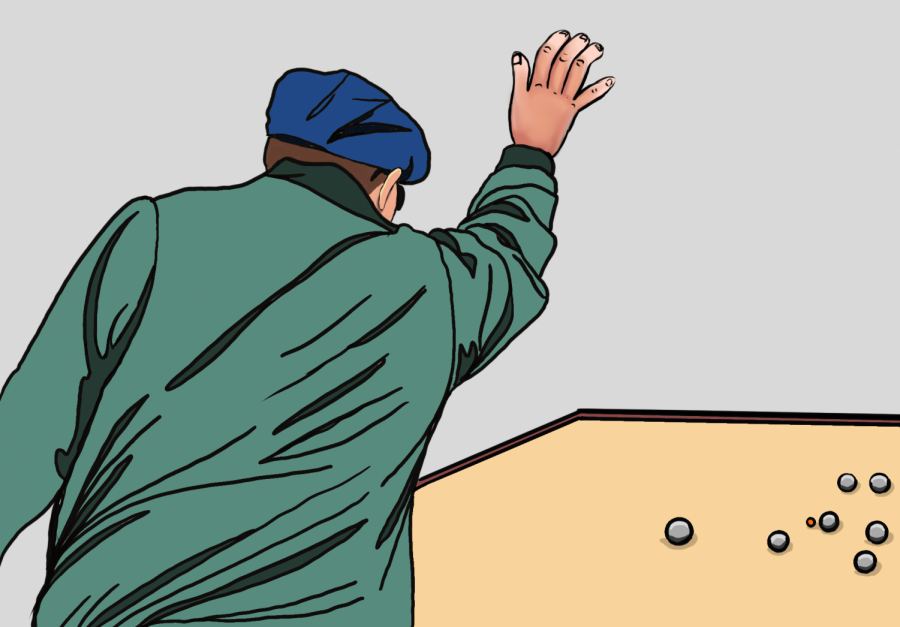By their nature, intramural sports games don’t draw in the largest crowds. For women’s flag football teams, however, there is always one guaranteed, invested spectator: the coach. It’s an odd job to say the least, and not one with very obvious appeal. After all, the coach is often the same age as his or her players, is not paid for his or her time and, most of all, volunteers to watch sports games rather than play in them. Yet, these coaches not only sign themselves up for the job, many have chosen to stick with it season after season.
For senior economics major and current coach of Kappa Kappa Gamma’s flag football team Sugarsuren Byambasuren, coaching women’s flag football is the experience you’d expect any coach to have. He was asked to coach the team as a first-year student and agreed enthusiastically. Having played football in high school, Byambasuren had experience and knowledge about the game that his team knew would be useful to them, and the idea of sharing that experience with others excited his interest.
“When I was in high school, I had great coaches, and that’s what inspired me to actually coach. It’s a way to give back to the passion I’ve gained from the sport,” said Byambasuren.
For Byambasuren, coaching provides an opportunity to share a meaningful part of his life with others. He wants his players to take away from their time on the team those same valuable lessons, memories and friendships that football provided him as a player. It’s that same concept of giving back that has kept Byambasuren coaching for four years. Due to the consistent roster turnover that comes with graduating seniors and incoming first-year students, his role never disappears.
“What’s best for me when I coach,” he said, “is when I see an improvement in someone from the first game to the last game of the season. You want to keep improving the game and the players as much as possible. I guess that’s what keeps me coming back.”

Senior environmental humanities major Nelson Falkenburg, coach of the Drink Tank women’s flag football team, sees his role differently. While Falkenburg teaches, plays and shares the limited knowledge he has about the sport, he sees his role as much more of a “figurehead” of sorts. He has assigned himself such duties as dressing in a full suit and tie for games and giving motivational speeches. Unlike Byambasuren, Falkenburg has a limited background in playing football, so he does not take himself too seriously as a mentor to his team.
“I’m not an authority figure by any means. I’m more like a team member that doesn’t play, that sometimes gives advice and makes suggestions,” he said.
Though he does not play in the games and may not coach in a traditional sense, Falkenburg has nonetheless made himself a part of his team. He shares in all the team’s victories and defeats, attends every practice and contributes in whatever way he can. The connection he feels as a member of the team is enough to make the time worthwhile.
One thing both coaches agree on is that, whether they are coaching or playing, they still feel the same thrills of competition. Byambasuren’s attitude towards winning reflects his outlook on coaching in general: competition is a part of the sport to be valued like any other.
“What’s important is getting out there and having a good time, but obviously winning is an important aspect. If you’re not playing to win, it’s kind of like, what’s the point,” said Byambasuren.
For Falkenburg, that competitiveness is as real for coaches as it is for players.
“Every coach ever always says, ‘Oh, in the end it’s about having fun,'” he said, “but that’s not true. At times I got way more into it than I thought I would, and it was really fun to feel that from a coaching perspective.”
In any case, it seems that coaching shares many of the same rewards as playing sports. Sophomore biology major and this year’s Alpha Phi coach Grant Laco sees the reward in the simple act of involvement.
“For me it’s just a fun thing to do on a weekend. It’s a good excuse to get out on Ankeny, throw a ball around, be goofy and be active. I wouldn’t say I’ve learned many life lessons from it, but it’s a good way to have fun,” said Laco.
No matter the role one assumes as coach, there is something worthwhile to be taken from it. Activity, teamwork and mentorship are all beloved elements in sports that do not necessarily require a jersey.
“How much did I really contribute to this? It’s been negligible,” said Falkenburg. “But that I can claim some piece of ownership in it all, it’s made it really fun.”










